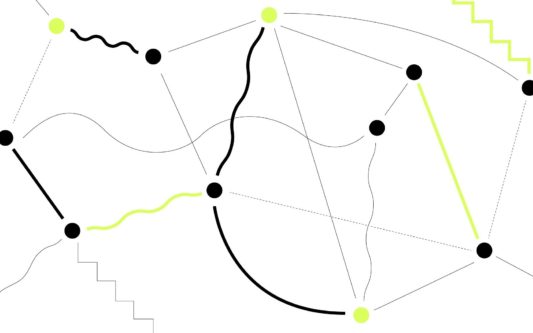Do you have ambitious plans you would like help with?
Please get in touch
Please get in touch
The Rise of the Polymath

If you were born in the UK, from the age of 14, you are asked to make choices that funnel you into educational streams. As you are in the full flow of teendom, you are once again asked to make critical choices on further education.
In other words, you have been asked to focus and specialize even before you know what it is that helps you learn who you want to be. Before you know it, your ambitions are set on getting a job that will almost certainly narrow your thinking further. We believe things are, and should be, changing.
There is an emerging generation that have been taught to believe that they can do anything. They have seen enough disruption to understand it is merely another part of their everyday future and there is no such thing as a long-term predictable career. There are many young people in jobs today who are building their experience only to prepare themselves to make their start-up dream a reality, as soon as they possibly can.
Creative expression is flourishing, in all kinds of places from Tiktok to Clubhouse, in open banking and new financial services to breakthrough food & drink products. Even in a pandemic year, over 2300 startups were launched in 2020, encouraged by a maturing support system. Then there are those that are seeing their jobs vanish, accelerated by technology, consumer trends and the black swan events. The time is ripe for the rise of the polymath.
The Business Need for Polymaths
Although this pandemic may thankfully be on the retreat, it will leave a profound change in business thinking. It will transform not only the way we work, but the business models and organizational structures we had been used to. And there is no going back.
While each business may have different challenges, they have recognized the need make things happen faster. Every business has seen the benefits of flexible ways of working. They understand that consumer trends long predicted can accelerate dramatically.
In other words, companies have had to overcome internal constraints or reservations in order to adapt, innovate and move forward at pace. Especially if they are to thrive in new and fluid realities.

What is a Polymath and How Can They Help?
If you are familiar with the term at all, Leonardo Da Vinci is probably often thought of as the best example of a man of such wide learning and curiosity. It would have been fantastic to see what he would have done as an online content creator or what start-up he would have created.
However, the Leonardo types are rather rare. The ability to understand a wide range of topics and to see a problem from different perspectives is a quality that could greatly help businesses today.
Polymaths are problem solvers, but they are not a solution in themselves. They connect dots at speed with a clear focus on achieving the right outcome. The dots they connect might be expert pools of knowledge, highly experienced talent, a creative breakthrough, a new technology, or simply a clever commercial strategy. They are focused on solving the problem and making things happen.
We believe these qualities are essential in helping businesses to not only react to industry-changing events but to find new opportunities and successfully tap into them. Businesses have always claimed to look for lateral thinkers, but polymaths are lateral doers. In our opinion, they are key nodes within a fast, flexible future facing business which is needed now more than ever before.

Nature or Nurture?
Unfortunately finding polymaths is not any easy task. We would need to see significant changes in an approach to education before we see natural candidates emerging in greater numbers from our institutions.
Fortunately, there are already interesting early-stage initiatives supporting this. The London Interdisciplinary School is trying to establish a new university and a new kind of degree that teaches students across disciplines. From science to commerce and the arts, with the objective of promoting “a new style of graduate who is more rounded and able to solve problems”.
Corporations are also employing culture change consultants by the dozens, attempting to train existing employees in subjects ranging from growth hacking to agile teaming to internalizing innovation. But all of this will take time and siloes are difficult to break down.
At Zag, we developed a culture where we could connect the dots of creative thinking with commercial insights and an entrepreneurial zeal to drive the right results.
We took two important steps:
1) Creating the right learning environment. We want our team to have exposure to the right kind of experience over time.
New team members have access to working with great entrepreneurs who understood the meaning of being a polymath before they had ever heard the term. These entrepreneurs had limited time in which to validate their innovation using whatever resources they could procure or hustle.
They could not afford to develop amazing brands with no customers. They had to demonstrate real world results to their investors or potential investors. They provided us with a fantastic environment within which our talent learned the importance of interdisciplinary thinking and the need to make things happen, even if that meant creating bespoke solutions for unique problems.
2) Creating the right commercial ethos. We want to reinforce our solution-based approach by ensuring our success was aligned with the success of our work. Unlike most consultancies and agencies, we do not use a time and material fee model with any of our corporate clients. We focus on the outcome with our creative business solutions, made possible by polymaths.

Polymaths in Every Organisation
Of course there have always been polymaths in every successful business. These resourceful individuals have implemented innovative ideas and overcome internal structures or resource constraints. In our sector, we have seen strategic consultancies trying to acquire creative thinking and be more entrepreneurial, and we have seen creative agencies trying to be more like consultancies.
We see organisations trying to remould themselves around the need to do things faster. From experience, it is difficult to acquire this mindset or create it quickly. (It’s taken us almost 10 years.) This culture takes some time to cook, and many businesses may not be able to wait for this to happen as the need to break out of siloed thinking and creating innovation has just recently become a priority.
Polymaths - an essential ingredient in any future-facing success story.
